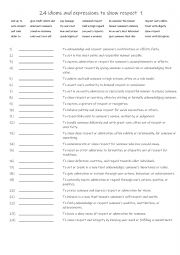
|
B1+-C1 24 idioms and expressions to show respect 1
First, students need to familiarise themselves with the 20 idioms and expressions and their meanings. Then they read the definitions to see which one is being described and write that word in the space provided Answers on page 2.
Level: intermediate
Age: 12-100
Type:
Downloads: 105
|
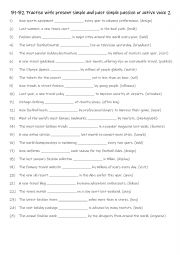
|
B1-B2 Practise with present simple and past simple passive or active voice 2
Understanding both voices help students become more versatile in expressing ideas, improving their ability to describe events and actions in the present and past from different perspectives. First, students need to familiarise themselves with the 2 tenses using both the active & passive voice. Then they read the sentences to see which one is needed...
Level: intermediate
Age: 10-100
Type:
Downloads: 110
|
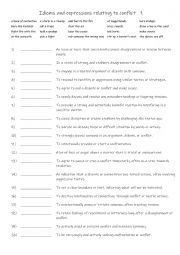
|
B1+-C1 Idioms and expressions relating to conflict 1
First, students need to familiarise themselves with the 20 idioms and expressions and their meanings. Then they read the definitions to see which one is being described and write that word in the space provided Answers on page 2.
Level: intermediate
Age: 12-100
Type:
Downloads: 106
|
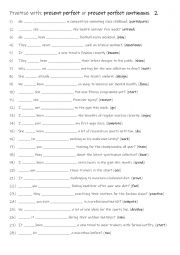
|
A2+-B1 Practise with present perfect or present perfect continuous 2
Mastering the 2 tenses enables students to discuss life experiences, actions that continue from the past, and to link past events with the present, improving fluency and communication in various contexts. First Students familiarise themselves with the 2 tenses and their use. Then they read the sentences to work out which one is needed to complete t...
Level: elementary
Age: 10-100
Type:
Downloads: 120
|
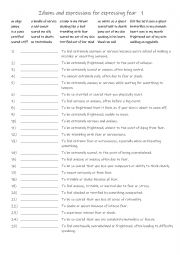
|
B2-C1 Idioms and expressions for expressing fear 1
First, students need to familiarise themselves with the 20 idioms and expressions and their meanings. Then they read the definitions to see which one is being described and write that word in the space provided Answers on page 2.
Level: advanced
Age: 12-100
Type:
Downloads: 101
|
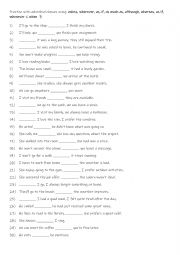
|
A2+-B1 10 Adverbial clauses 3
Learning adverbial clauses using words like unless, wherever, as, if, as much as, although, whereas, as if, whenever and when helps students express complex relationships between ideas, such as condition, time, contrast, and manner. First, students need to familiarise themselves with the 10 adverbial clauses and their use. Then they read the senten...
Level: intermediate
Age: 10-100
Type:
Downloads: 123
|
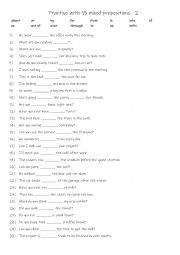
|
A1+-A2 Practise with 15 mixed prepositions 2
Mastering prepositions is vital for expressing relationships between ideas in English. They help indicate time, place, direction, and cause, making sentences more precise and meaningful. First, students need to familiarise themselves with the 15 prepositions and their use. Then they read the sentences to work out which preposition is needed to comp...
Level: elementary
Age: 9-100
Type:
Downloads: 107
|
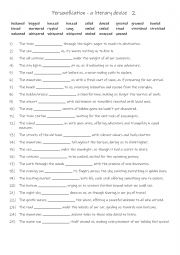
|
B2-C1 Personification - a literary device 2
Learning personification helps students bring their writing to life by giving human qualities to non-human things, making descriptions more engaging and relatable. It enhances creativity, allowing them to craft vivid imagery and evoke emotions in their readers. Understanding personification also deepens their appreciation of literature, as it is ...
Level: advanced
Age: 14-100
Type:
Downloads: 108
|
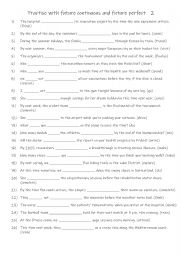
|
A2-B1 Practise with future continuous and future perfect 2
First Students familiarise themselves with the 2 tenses and their use. Then they read the sentences to work out which one is needed to complete the gap-fill using the infinitive in (). Each tense is used 13 times! Answers on page 2
Level: elementary
Age: 9-100
Type:
Downloads: 117
|
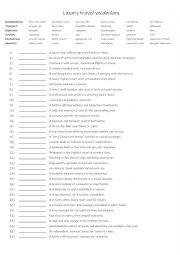
|
A2+-B1 Luxury travel vocabulary
Students familiarise themselves with the 30 words and their meanings, then they read the definitions to work out and write in the space provided which one is being described. Answers on page 2.
Level: intermediate
Age: 9-100
Type:
Downloads: 130
|












